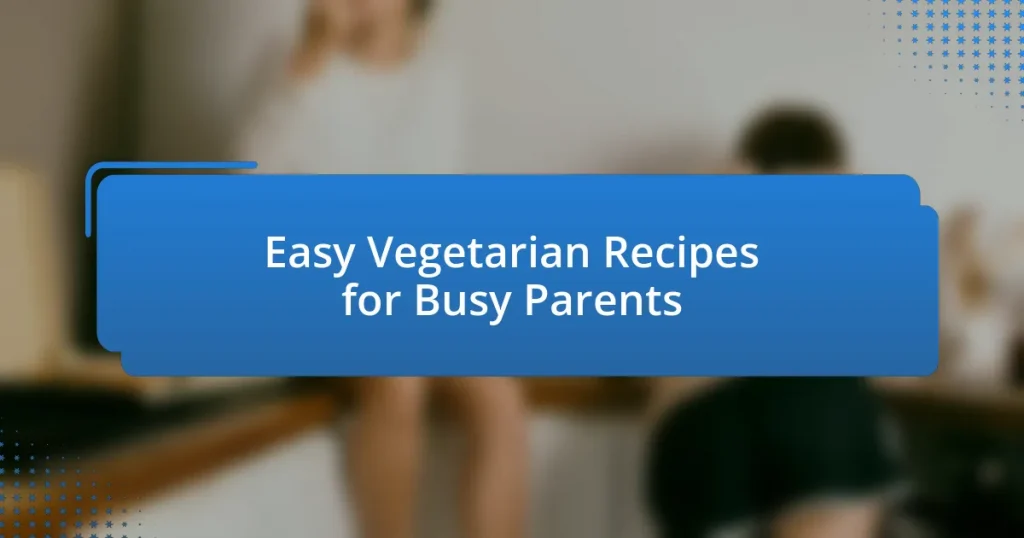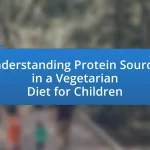Easy vegetarian recipes for busy parents provide quick and nutritious meal options that cater to hectic schedules. The article outlines various recipes such as vegetable stir-fry, chickpea salad, and pasta primavera, emphasizing their simplicity and health benefits. It discusses the advantages of vegetarian diets, including lower costs, reduced cooking times, and improved health outcomes for families. Additionally, practical tips for meal preparation, ingredient selection, and involving children in cooking are provided, ensuring that parents can maintain a balanced and healthy vegetarian diet without sacrificing convenience.
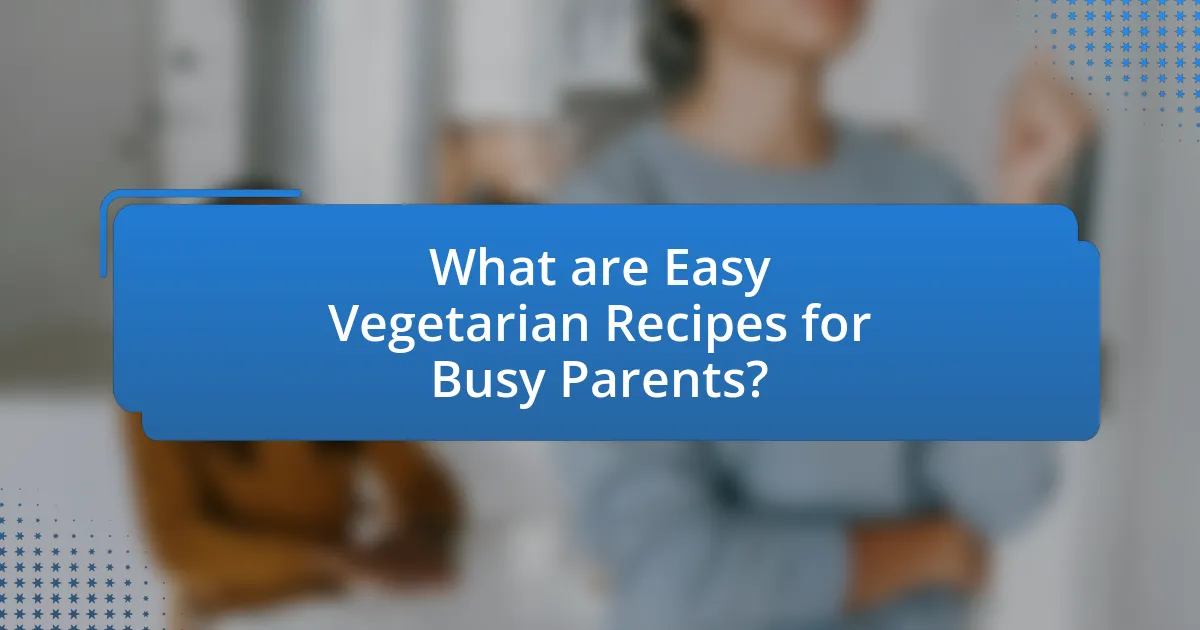
What are Easy Vegetarian Recipes for Busy Parents?
Easy vegetarian recipes for busy parents include quick options like vegetable stir-fry, chickpea salad, and pasta primavera. Vegetable stir-fry can be prepared in under 30 minutes using pre-cut vegetables and tofu, providing a nutritious meal rich in vitamins and protein. Chickpea salad, made with canned chickpeas, diced cucumbers, tomatoes, and a simple dressing, takes about 15 minutes to assemble and is high in fiber. Pasta primavera, which combines whole grain pasta with seasonal vegetables and a light sauce, can be cooked in 20 minutes, offering a balanced meal that is both filling and easy to prepare. These recipes are designed to be simple and quick, catering to the time constraints of busy parents while ensuring healthy eating.
Why should busy parents consider vegetarian recipes?
Busy parents should consider vegetarian recipes because they offer quick, nutritious meal options that can save time and promote health. Vegetarian meals are often simpler to prepare, requiring fewer ingredients and less cooking time, which is ideal for parents with hectic schedules. Additionally, studies show that plant-based diets can lower the risk of chronic diseases, such as heart disease and diabetes, making vegetarian recipes a healthier choice for families. By incorporating more vegetables, legumes, and whole grains, parents can ensure their children receive essential nutrients while also fostering healthy eating habits.
What health benefits do vegetarian meals provide for families?
Vegetarian meals provide numerous health benefits for families, including improved heart health, lower risk of chronic diseases, and enhanced nutrient intake. Research indicates that diets rich in plant-based foods can reduce the risk of heart disease by up to 32% due to lower saturated fat and cholesterol levels. Additionally, vegetarian diets are associated with a decreased risk of type 2 diabetes and certain cancers, as they are typically high in fiber, vitamins, and antioxidants. Families adopting vegetarian meals often experience better weight management, as plant-based diets tend to be lower in calories while still being nutrient-dense.
How can vegetarian meals save time and money for busy parents?
Vegetarian meals can save time and money for busy parents by utilizing cost-effective ingredients and simplifying meal preparation. Plant-based foods, such as beans, lentils, and seasonal vegetables, are generally less expensive than meat, allowing families to reduce grocery bills. Additionally, vegetarian recipes often require shorter cooking times and fewer steps, which can streamline the cooking process. For instance, one-pot meals and batch cooking can be employed to prepare multiple servings at once, minimizing time spent in the kitchen. Studies indicate that meal planning around vegetarian options can lead to a 20-30% reduction in food costs, making it a practical choice for families looking to save both time and money.
What types of easy vegetarian recipes are available?
Easy vegetarian recipes include salads, stir-fries, pasta dishes, soups, and grain bowls. These recipes are designed to be quick and simple, often requiring minimal ingredients and preparation time, making them ideal for busy parents. For example, a quinoa salad can be prepared in under 30 minutes and provides a nutritious meal option. Stir-fries can be customized with various vegetables and sauces, allowing for versatility and ease. Additionally, pasta dishes like vegetable marinara can be made in one pot, reducing cleanup time. These types of recipes cater to the need for healthy, convenient meals that fit into a hectic lifestyle.
What are some quick breakfast ideas for busy mornings?
Quick breakfast ideas for busy mornings include overnight oats, smoothies, and yogurt parfaits. Overnight oats can be prepared the night before by combining rolled oats with milk or yogurt and toppings like fruits or nuts, making them ready to eat in the morning. Smoothies can be blended quickly using fruits, vegetables, and a protein source, allowing for a nutritious meal on the go. Yogurt parfaits consist of layering yogurt with granola and fruits, which can be assembled in minutes and provide a balanced breakfast option. These ideas are efficient and cater to the needs of busy parents seeking vegetarian options.
How can parents prepare simple lunch options for kids?
Parents can prepare simple lunch options for kids by utilizing quick and nutritious ingredients such as whole grain bread, fresh vegetables, and plant-based proteins. For example, a whole grain sandwich filled with hummus, sliced cucumbers, and shredded carrots can be assembled in under five minutes. Additionally, parents can create wraps using tortillas filled with spinach, avocado, and black beans, providing a balanced meal that is easy to eat. Research indicates that incorporating a variety of colors and textures in meals can enhance children’s willingness to try new foods, making these simple options not only quick to prepare but also appealing to young eaters.
What are some effortless dinner recipes that the whole family will enjoy?
Effortless dinner recipes that the whole family will enjoy include vegetable stir-fry, pasta primavera, and black bean tacos. Vegetable stir-fry combines seasonal vegetables with soy sauce and can be prepared in under 30 minutes, making it a quick and nutritious option. Pasta primavera features pasta tossed with fresh vegetables and olive oil, providing a colorful and appealing meal that can be ready in about 20 minutes. Black bean tacos are simple to assemble, requiring only black beans, tortillas, and toppings like cheese and salsa, allowing for customization and ease of preparation. These recipes are not only quick but also cater to various tastes, ensuring family satisfaction.
How can busy parents adapt vegetarian recipes to fit their schedules?
Busy parents can adapt vegetarian recipes to fit their schedules by utilizing meal prep techniques, quick-cooking methods, and one-pot meals. Meal prepping allows parents to prepare ingredients in advance, reducing cooking time during the week. Quick-cooking methods, such as stir-frying or using pressure cookers, can significantly decrease meal preparation time. One-pot meals simplify the cooking process by combining all ingredients in a single dish, minimizing cleanup and cooking time. These strategies enable busy parents to maintain a vegetarian diet without sacrificing time or convenience.
What meal prep strategies can help save time during the week?
Batch cooking is a meal prep strategy that can significantly save time during the week. By preparing large quantities of meals in advance, busy parents can ensure they have ready-to-eat options available, reducing daily cooking time. For instance, cooking grains, legumes, and vegetables in bulk allows for quick assembly of meals throughout the week. Research indicates that batch cooking can cut meal preparation time by up to 50%, making it an efficient approach for families with tight schedules. Additionally, using versatile ingredients that can be repurposed in different dishes enhances efficiency and minimizes waste.
How can parents involve their children in the cooking process?
Parents can involve their children in the cooking process by assigning age-appropriate tasks such as washing vegetables, measuring ingredients, or stirring mixtures. Engaging children in these activities not only teaches them essential cooking skills but also fosters a sense of responsibility and teamwork. Research indicates that children who participate in cooking are more likely to develop healthier eating habits and a positive attitude towards food preparation. For example, a study published in the Journal of Nutrition Education and Behavior found that children who helped in meal preparation were more inclined to try new foods and make healthier choices.
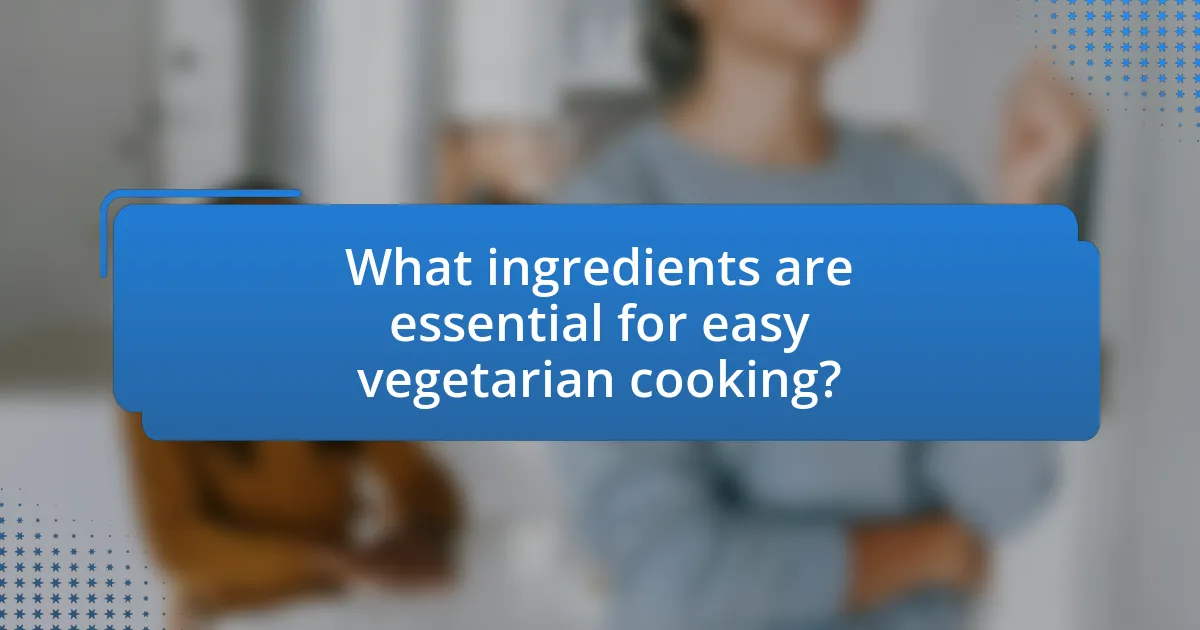
What ingredients are essential for easy vegetarian cooking?
Essential ingredients for easy vegetarian cooking include vegetables, legumes, grains, dairy or dairy alternatives, and spices. Vegetables such as bell peppers, spinach, and carrots provide essential nutrients and flavor. Legumes like lentils and chickpeas are excellent protein sources, while grains such as rice and quinoa serve as hearty bases for meals. Dairy products or plant-based alternatives like almond milk and tofu offer additional protein and texture. Spices such as garlic, cumin, and basil enhance the overall taste of vegetarian dishes. These ingredients collectively facilitate quick and nutritious meal preparation, making them ideal for busy parents.
Which pantry staples should busy parents always have on hand?
Busy parents should always have rice, pasta, canned beans, canned tomatoes, and frozen vegetables on hand. These staples provide a versatile base for quick and nutritious meals. Rice and pasta serve as filling carbohydrates, while canned beans and tomatoes offer protein and essential nutrients. Frozen vegetables retain their nutritional value and can be easily added to various dishes, making meal preparation faster and simpler. Having these items readily available allows for the creation of easy vegetarian recipes, ensuring that busy parents can prepare healthy meals without extensive planning or shopping.
What fresh produce is best for quick vegetarian meals?
Leafy greens, bell peppers, tomatoes, zucchini, and avocados are the best fresh produce for quick vegetarian meals. Leafy greens like spinach and kale can be quickly sautéed or added to salads, providing essential nutrients. Bell peppers and tomatoes can be chopped and used in stir-fries or as toppings, enhancing flavor and color. Zucchini can be spiralized or sautéed, offering a low-carb pasta alternative. Avocados are versatile, serving as spreads or toppings, and are rich in healthy fats. These vegetables not only cook quickly but also contribute to a balanced diet, making them ideal for busy parents preparing meals.
How can frozen ingredients simplify meal preparation?
Frozen ingredients simplify meal preparation by providing convenience and reducing cooking time. They are pre-washed, pre-cut, and often pre-cooked, allowing busy parents to quickly assemble meals without extensive prep work. Studies show that using frozen vegetables can save up to 30% of meal prep time compared to fresh ingredients, making it easier to create nutritious meals on a tight schedule. Additionally, frozen ingredients have a longer shelf life, minimizing food waste and ensuring that healthy options are always available.
What are some versatile ingredients that can be used in multiple recipes?
Some versatile ingredients that can be used in multiple recipes include beans, rice, and tomatoes. Beans serve as a protein source and can be incorporated into salads, soups, and tacos. Rice acts as a base for stir-fries, casseroles, and grain bowls. Tomatoes, whether fresh, canned, or in sauce form, enhance the flavor of pasta dishes, stews, and salsas. These ingredients are staples in many vegetarian recipes, providing flexibility and ease for busy parents.
How can legumes and grains enhance vegetarian meals?
Legumes and grains enhance vegetarian meals by providing essential nutrients, including protein, fiber, and various vitamins and minerals. Legumes, such as beans and lentils, are rich in protein, offering a complete amino acid profile when combined with grains like rice or quinoa. This combination not only improves the nutritional value of meals but also promotes satiety, making them more filling. Additionally, legumes and grains contribute to digestive health due to their high fiber content, which can help regulate blood sugar levels and support heart health. Studies show that incorporating these foods into a diet can lead to improved overall health outcomes, making them a vital component of vegetarian meals.
What role do spices and herbs play in vegetarian cooking?
Spices and herbs are essential in vegetarian cooking as they enhance flavor, aroma, and nutritional value. In vegetarian dishes, where ingredients may lack the richness of meat, spices and herbs provide depth and complexity, making meals more enjoyable. For instance, herbs like basil and cilantro can brighten a dish, while spices such as cumin and paprika add warmth and earthiness. Studies show that the use of herbs and spices can also increase the antioxidant content of meals, contributing to better health outcomes.
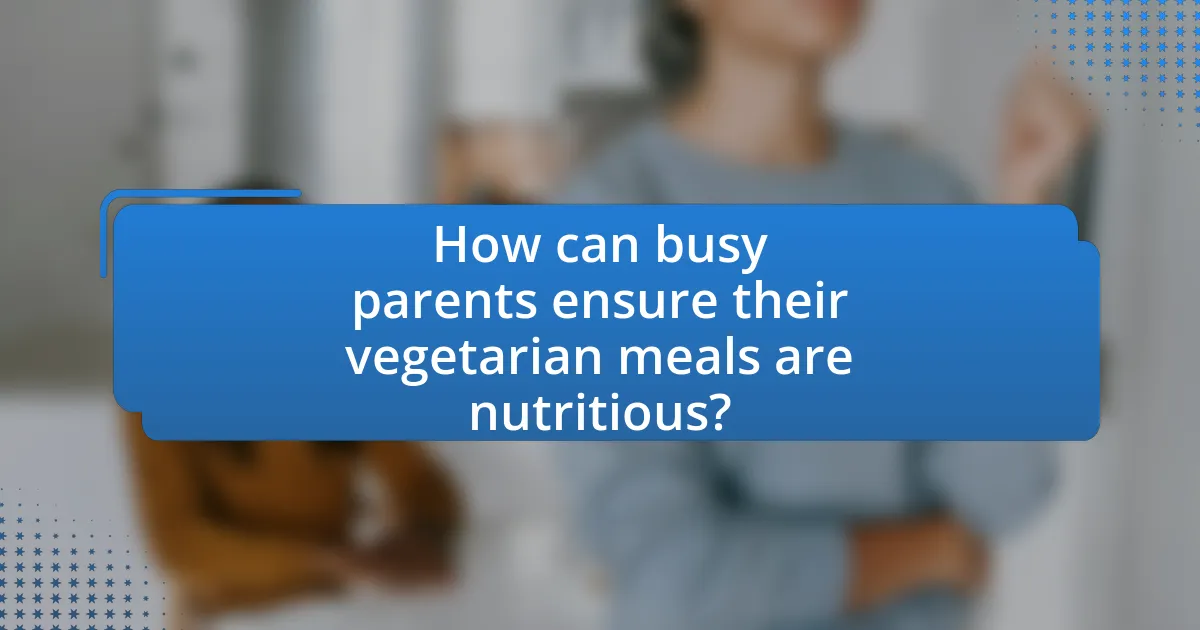
How can busy parents ensure their vegetarian meals are nutritious?
Busy parents can ensure their vegetarian meals are nutritious by incorporating a variety of whole foods, including legumes, whole grains, fruits, and vegetables, while also paying attention to protein, iron, calcium, and vitamin B12 sources. For instance, combining beans with rice provides a complete protein, while leafy greens and fortified plant-based milks can help meet calcium and vitamin B12 needs. Research indicates that a well-planned vegetarian diet can provide all essential nutrients, as outlined by the Academy of Nutrition and Dietetics, which states that appropriately planned vegetarian diets are healthful, nutritionally adequate, and may provide health benefits in the prevention and treatment of certain diseases.
What are the key nutrients to focus on in vegetarian diets?
Key nutrients to focus on in vegetarian diets include protein, iron, calcium, vitamin B12, and omega-3 fatty acids. Protein can be obtained from legumes, nuts, and soy products, which are essential for muscle repair and growth. Iron is crucial for oxygen transport in the blood and can be sourced from lentils, chickpeas, and fortified cereals; pairing these with vitamin C-rich foods enhances absorption. Calcium is vital for bone health and can be found in leafy greens, tofu, and fortified plant milks. Vitamin B12, important for nerve function and red blood cell production, is primarily found in animal products, so vegetarians should consider fortified foods or supplements. Omega-3 fatty acids, which support heart and brain health, can be sourced from flaxseeds, chia seeds, and walnuts. These nutrients are essential for maintaining overall health in a vegetarian diet.
How can parents ensure their children are getting enough protein?
Parents can ensure their children are getting enough protein by incorporating a variety of protein-rich vegetarian foods into their meals. Foods such as legumes, nuts, seeds, dairy products, and whole grains provide essential protein. For example, one cup of cooked lentils contains about 18 grams of protein, while a serving of Greek yogurt can offer around 10 grams. Additionally, combining different protein sources, like rice and beans, can create a complete amino acid profile, ensuring children receive all necessary nutrients.
What are some ways to incorporate essential vitamins and minerals?
Incorporating essential vitamins and minerals can be achieved through a variety of methods, particularly by including a diverse range of fruits, vegetables, whole grains, nuts, and seeds in meals. For example, leafy greens like spinach and kale are rich in vitamins A, C, and K, while legumes such as lentils and chickpeas provide essential minerals like iron and magnesium. Additionally, incorporating fortified plant-based milk can enhance calcium and vitamin D intake. Research indicates that a balanced vegetarian diet can meet nutritional needs effectively, as long as it includes a variety of food sources to cover all essential nutrients.
How can parents balance convenience and nutrition in their meals?
Parents can balance convenience and nutrition in their meals by planning and preparing meals in advance while incorporating nutrient-dense ingredients. Meal prepping allows parents to save time during busy weekdays, as they can batch-cook healthy vegetarian dishes that are easy to reheat. Research indicates that meal planning can lead to healthier eating habits, as it encourages the inclusion of a variety of vegetables, whole grains, and legumes, which are essential for a balanced diet. Additionally, utilizing quick cooking methods, such as stir-frying or using a pressure cooker, can further enhance convenience without sacrificing nutritional value.
What are some tips for choosing healthy convenience foods?
To choose healthy convenience foods, prioritize items with minimal ingredients, focusing on whole foods like fruits, vegetables, whole grains, and lean proteins. These foods often contain fewer additives and preservatives, making them a better choice for nutrition. For example, selecting frozen vegetables without added sauces or canned beans with no added salt can enhance the healthiness of meals. Additionally, reading nutrition labels is crucial; aim for options low in saturated fats, sugars, and sodium while high in fiber and protein. Research indicates that diets rich in whole foods can reduce the risk of chronic diseases, supporting the importance of these choices.
How can parents create balanced meals quickly?
Parents can create balanced meals quickly by utilizing pre-prepared ingredients, such as pre-chopped vegetables, canned beans, and whole grains like quinoa or brown rice. This approach allows for the assembly of nutritious meals in under 30 minutes. For instance, a stir-fry with pre-cut vegetables and tofu can be cooked in a single pan, providing a balance of protein, fiber, and essential vitamins. Studies show that meal prepping and using convenience items can significantly reduce cooking time while maintaining nutritional quality, making it easier for busy parents to provide healthy meals.
What are some practical tips for busy parents cooking vegetarian meals?
Busy parents can efficiently cook vegetarian meals by planning weekly menus, utilizing batch cooking, and incorporating quick recipes. Planning menus allows parents to streamline grocery shopping and meal preparation, reducing last-minute stress. Batch cooking, where larger quantities of meals are prepared and stored for later use, saves time on busy days. Quick recipes, such as stir-fries or salads, can be made in under 30 minutes, making them ideal for hectic schedules. Additionally, keeping a well-stocked pantry with staples like beans, lentils, and grains ensures that nutritious meals can be prepared quickly.
